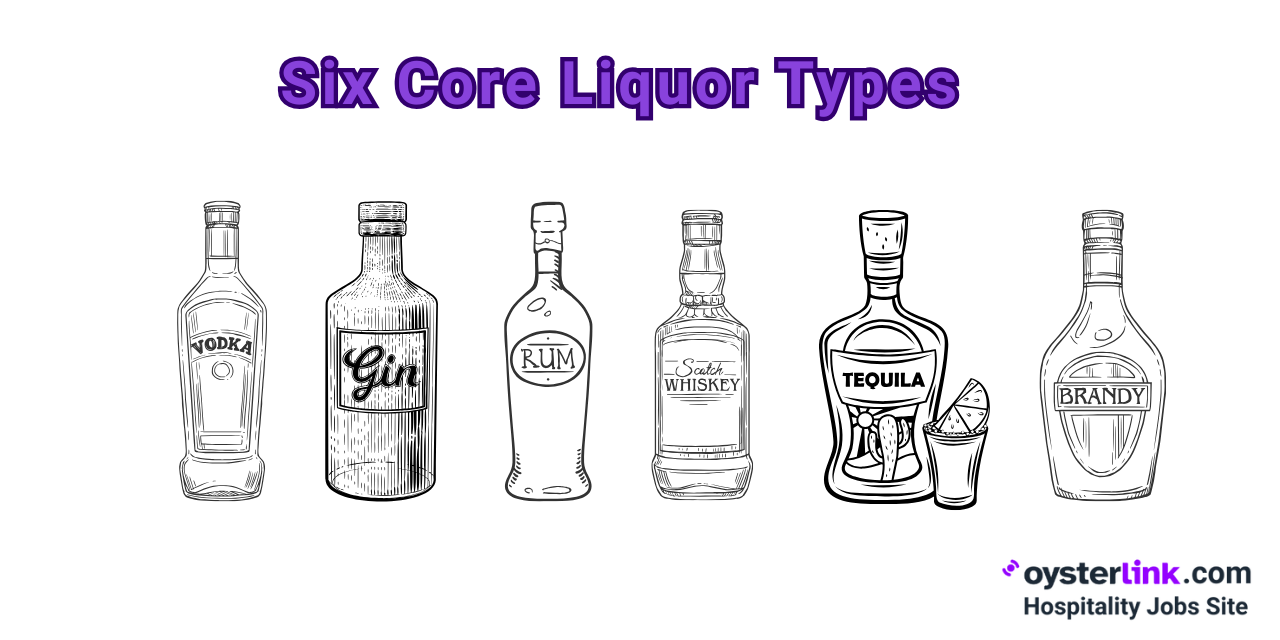Basic liquor knowledge for Servers is more than memorizing drink names.
Here we’ll cover the six essential spirits, how to check IDs, recognize intoxication, and follow alcohol laws so you can serve with confidence.
Essential Liquor Types and Basic Liquor Knowledge for Servers
Servers should recognize the six key liquor types: vodka, gin, rum, tequila, whiskey and brandy.
Each brings its own flavor, aroma and typical uses, which are important for making drink recommendations and answering guest questions accurately.

Vodka
Known for its clear appearance and an almost neutral flavor profile, vodka is a versatile spirit that serves as a smooth, clean base for a variety of mixers.
Its neutrality makes it ideal for light, refreshing drinks.
- Popular brands: Absolut, Smirnoff, Grey Goose, Tito’s.
- Key characteristics: Light, highly mixable, usually distilled from grains or potatoes.
- Common uses: Vodka Soda, Cosmopolitan, and Moscow Mule.
Gin
Gin stands out for its distinctive crisp, pine-like aroma and flavor, a result of juniper berries.
It also has herbal, citrus and floral notes that vary depending on the botanicals used in distillation.
- Popular brands: Tanqueray, Bombay Sapphire, Beefeater, Hendrix.
- Key characteristics: Botanical, herbal, with citrus and pine elements.
- Common uses: Gin & Tonic, Tom Collins, and Negroni.
Rum
Rum is a distilled spirit made from sugarcane or molasses, available in many styles suited to different drinks.
Its flavor depends on the aging process and additives.
- Brand names: Bacardi (white), Captain Morgan (spiced), Myers’s (dark), Mount Gay, Ron Diplomático.
- Key characteristics: Sweet, smooth, ranges from light and clean to rich, spiced, or caramel-like.
- Common uses: Piña Coladas, Mojitos, Daiquiris, and Spiced Rum Punches.
Tequila
Made in Mexico from blue agave, tequila has three primary types, each with distinct flavor profiles.
- Popular brands: Patrón, Don Julio, Jose Cuervo, Espolòn.
- Key characteristics: Usually served with lime and salt.
- Common uses: Margaritas, Tequila Sunrise and Palomas.
Whiskey
Whiskey is a diverse category with various styles distinguished by production methods and regions.
- Popular brands: Jack Daniel’s, Jameson, Glenfiddich, Macallan, Bushmills.
- Key characteristics: Bourbon is sweet and full-bodied, Scotch is smoky and complex, Irish is light and smooth.
- Common uses: Neat, on the rocks, the Old Fashioned, Whiskey Sour and Manhattan.
Brandy
Distilled from wine or fruit juice, brandy is often enjoyed as an after-dinner drink but also featured in a range of cocktails.
- Famous types: Cognac (from France), Armagnac and other fruit brandies.
- Key characteristics: Smooth, slightly sweet, with fruity and oaky notes when aged.
- Common uses: Used in brandy Alexander, sidecars or warm drinks during colder months.
Adhering to Alcohol Serving Laws
Adhering to legal requirements is crucial: over-serving guests or providing alcohol to minors can jeopardize your job and pose serious legal risks to the business.
If a guest appears under 30, always ask for ID. When you check an ID:
- Check the birth date and expiration. Don’t hesitate to grab your phone calculator.
- Does the guest look remotely like the photo? If not, ask for a second ID — don’t just guess.
- Check for tampering (blurry print, weird font, bent edges).
Souce: Greenhouse Treatment
How To Identify Signs of Intoxication
Being able to recognize the physical and behavioral signs of intoxication is essential for responsible service. Look out for the following indicators:
- Slurred words, inability to focus
- Trouble standing or walking
- Very loud, disruptive or a sudden change in behaviour
- Fumbling for the wallet or being confused with the payment
If you spot several of these signs, slow down or stop service and tell a supervisor immediately.
Proper Techniques for Refusing Service
Sometimes, refusing to serve alcohol is necessary for safety and legal reasons. A prepared script can help:
- If underage or fake ID: “Sorry, I can’t serve you alcohol with this ID. You can still order food or a non-alcoholic drink.”
- If too intoxicated: “I’m sorry, I can’t serve you more alcohol. It’s for everyone’s safety. Would you like water or food instead?”
When in doubt, ask your manager for help (they’ve seen it all!).
Curious about the legal age to serve alcohol in your area? Click here to find out How Old Do You Have To Be To Serve Alcohol?
About OysterLink: Connecting Servers with Employers
OysterLink is the ultimate platform for restaurant professionals to connect with top employers.
Whether you're looking for your next great hospitality job or seeking the perfect talent to join your team, we've got you covered.
For job seekers, we offer salary insights, expert career advice, and the best job listings.
For employers, we provide powerful tools to craft standout job ads, find the ideal candidates, and access key industry resources.








Loading comments...